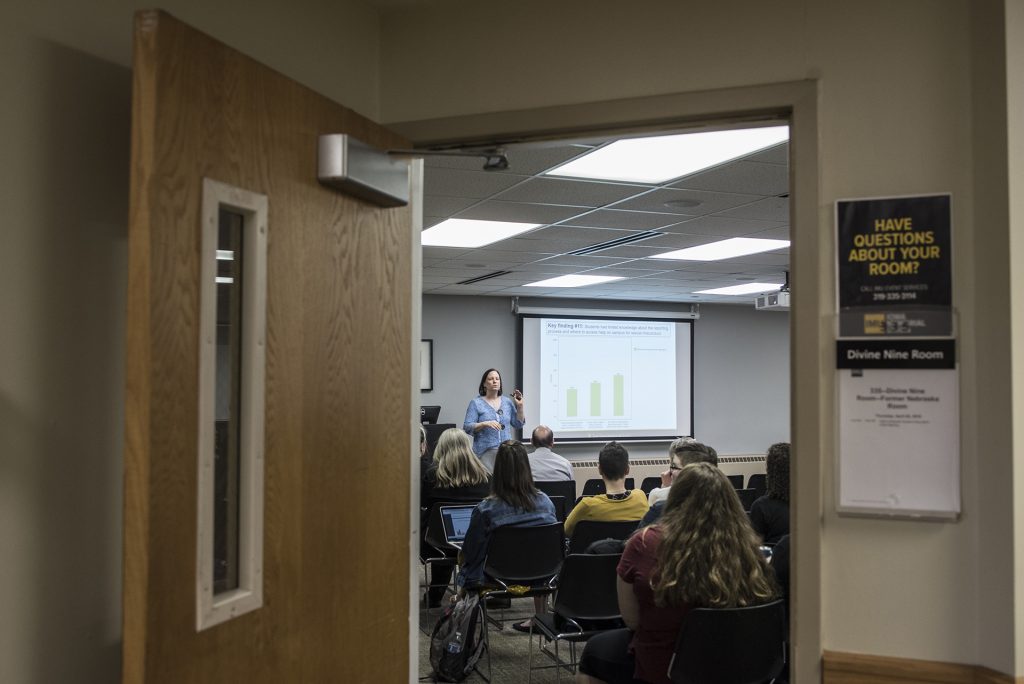University of Iowa officials have embraced one fact in their response to sexual misconduct: Their work is never quite complete.
As a reflection of the UI’s evolving response to and understanding of sexual misconduct and violence on campus, the university released the results from its second iteration of the Speak Out Iowa campus-climate survey on Thursday.
Researchers could draw more conclusions from the results of the 2017 survey, which received a response rate of 22.8 percent of students — a total of 6,952. The 2015 survey only had a response of 9.3 percent of students.
“… Last year, it helped, but I think this year, we’ll really start relying on the information in this report,” UI President Bruce Harreld told The Daily Iowan in March.
RELATED: UI gets improved response in second campus-wide sexual assault survey
Findings in the survey informed the UI’s second Antiviolence plan, an outline of the university’s strategy for combating sexual misconduct and violence on campus spanning from summer of 2018 to the spring of 2021. As with the first plan, released in 2016, the new plan is centered on prevention and education, intervention, and policy.
Four items from the first plan carried over to the new plan:
• Increasing messaging to parents about resources, policies, and procedures pertaining to violence and sexual misconduct and reporting such incidents
• Cultivating respectful and safe environments in departments and colleges in graduate and professional programs
• Increasing training for human-resources representatives and associate deans on effectively motivating behavioral change when facilitating an informal sexual-harassment resolution
• Ensuring coordinated responses with community partners and local law-enforcement agencies
“Our work around these issues is never done,” said Monique DiCarlo, the UI Sexual Misconduct Response coordinator Title IX coordinator, and chair of the Antiviolence said. “It’s an ongoing commitment, so some of the work that is in those ongoing things that we chose to carry over reflect projects that had been started and we wanted to go deeper on, we wanted to do more.”
RELATED: UI seizes upon ‘cultural moment’ to educate students on sexual violence
Specifically, the plan the UI will roll out this year builds upon the previous plan’s call to identify learning outcomes students should understand before graduating, DiCarlo said, taking the first plan’s objectives to put in place new strategies to engage students to achieve those desired outcomes. Such objectives include engaging in healthy relationships, understanding how to be an active bystander, knowing how to report a problem, and responding effectively to disclosures.
DiCarlo said one item addressed in the first plan that did not come to fruition was the goal to “increase survivors’ access to immediate support through the [Rape Victim Advocacy Program] advocacy and mobile messaging.” Because the Legislature last year defunded the 24-hour Iowa Sexual Abuse Hotline, which RVAP had managed, that resource was unable to be implemented, DiCarlo said. The measure remains unavailable.
Since former UI President Sally Mason unveiled her Six-Point Plan to Combat Sexual Assault in 2014, the UI has focused efforts on improving prevention and education, improving communication, and overall expanding resources to address sexual misconduct. Under the plan, the university formed a Sexual Misconduct Advisory Committee, expanded the Nite Ride service, and developed more sanctions for perpetrators.
RELATED: UI completes sex-assault plan, officials say
UI Vice President for Student Life Melissa Shivers said the more voices the university and Antiviolence Coalition hear from, the better the UI can respond to the issues facing the campus community.



